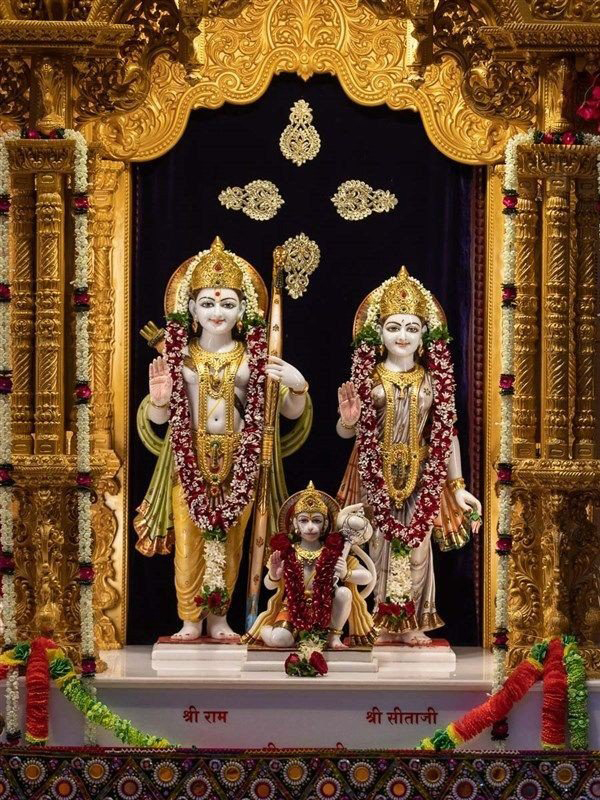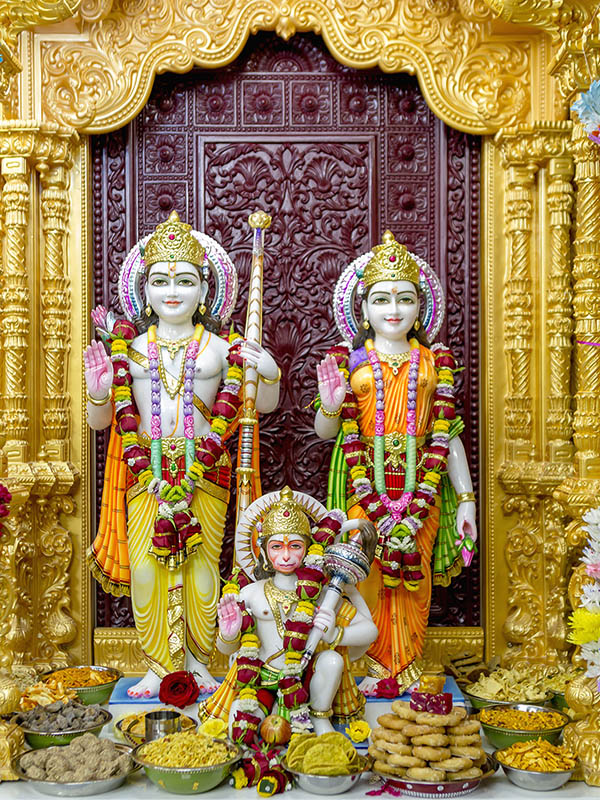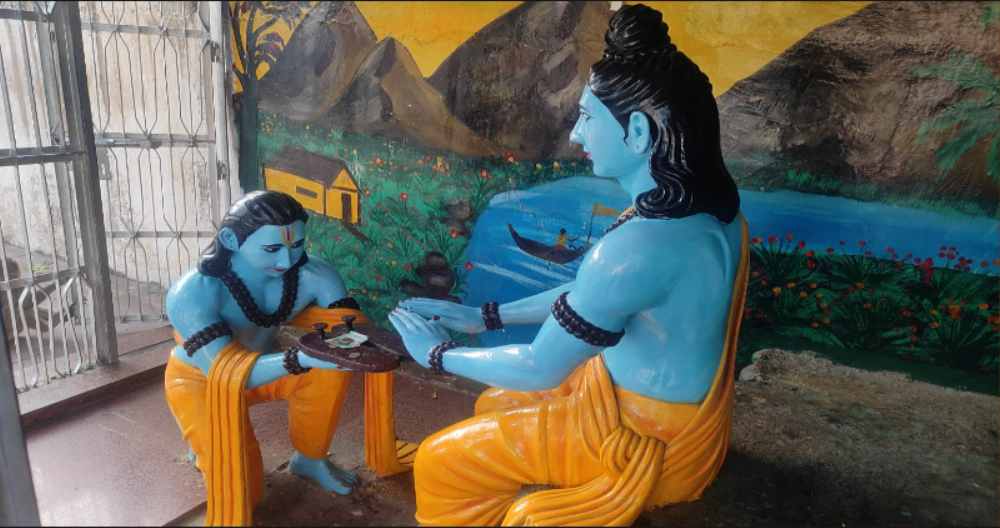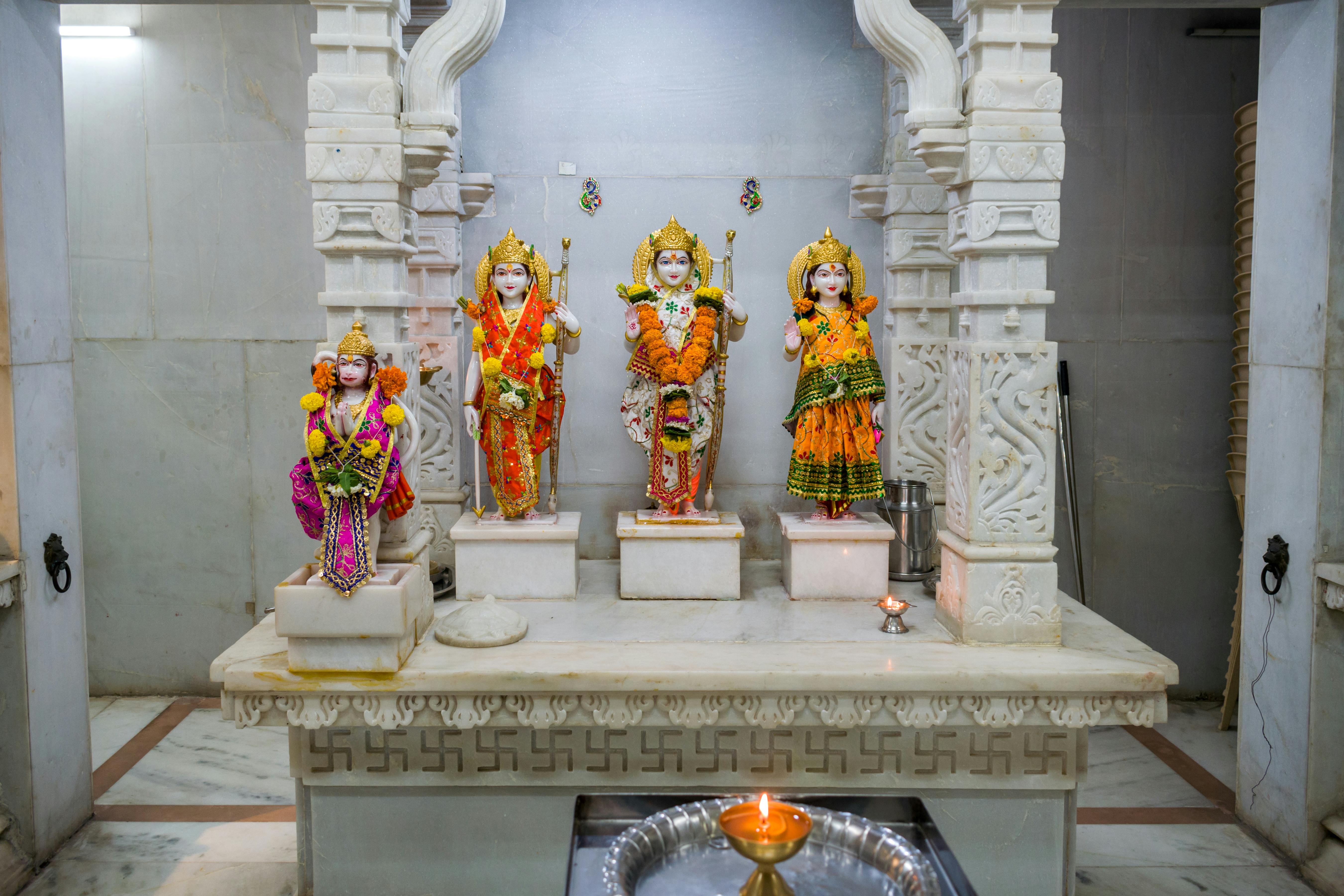Where the Mind Goes, the Soul Follows
In the vast ocean of ancient wisdom, few truths are as profound yet as simple as this: our final thought determines our next journey. The Bhagavad Gita’s eighth chapter reveals this eternal principle through Lord Krishna’s words:
अन्तकाले च मामेव स्मरन्मुक्त्वा कलेवरम् |
य: प्रयाति स मद्भावं याति नास्त्यत्र संशय: || 5||anta-kāle cha mām eva smaran muktvā kalevaram
yaḥ prayāti sa mad-bhāvaṁ yāti nāstyatra sanśhayaḥ“Those who let go of their body while thinking of Me at the time of death will reach Me. There is definitely no doubt about this.”
But how does one ensure their mind rests on the Divine at that crucial moment? The answer lies in the practice of detachment throughout life. Three remarkable tales from the Puranas illuminate this truth with startling clarity.
The Tale of King Bharat: When Love Becomes Bondage
Bharat was no ordinary king. Born as the eldest son of the great sage-king Rishabhdev, he was a devoted soul who had renounced his throne to pursue spiritual enlightenment. On the serene banks of the Gandaki River, in the hermitage of Pulah, he spent his days immersed in worship and meditation.
One fateful morning, as Bharat performed his sacred ablutions, a pregnant doe arrived at the opposite bank to quench her thirst. Suddenly, a lion’s roar shattered the forest’s peace. Terrified, the doe leaped into the rushing waters, but the shock proved fatal. As she perished, her unborn fawn tumbled into the river.
Moved by compassion, the sage-king rescued the helpless creature and began to care for it. What began as mercy slowly transformed into attachment. Day by day, his affection for the fawn deepened. His daily spiritual practices became irregular. The deer that once needed him now occupied his every thought.
When the deer matured and followed its natural instincts to join its herd, Bharat was devastated. He searched frantically, his mind consumed by worry and longing. In this state of anguish, death arrived, and his final thought was not of the Divine, but of the deer he loved.
The result was inevitable. In his next birth, Bharat was born as a deer.
Even the wise are not immune to attachment’s snare. If a spiritually advanced soul like Bharat could be derailed by affection for an animal, what of ordinary beings who are entangled in countless worldly relationships and desires?
Yet the story doesn’t end in tragedy. As a deer, Bharat retained the memory of his fall. This awareness became his salvation. He returned to his hermitage and resumed his penance, this time with the hard-earned wisdom of detachment firmly rooted in his consciousness.
In his subsequent birth as a brahmin, Bharat, now called Jadabharat, appeared outwardly foolish, deaf, and insane. But this was his shield against worldly entanglements. When thieves kidnapped him for human sacrifice, he remained unmoved. When the goddess Bhadrakali emerged to slay his captors, he watched with perfect equanimity.
Finally, when King Rahugana scolded him for his poor service as a palanquin bearer, Jadabharat broke his silence to deliver teachings that would transform the king’s understanding of reality itself.
The Tale of Dharma Sharma: The Parrot’s Wisdom
In another age, a brahmin’s son named Dharma Sharma struggled with ignorance. Despite his desire to learn, he found no teachers willing to instruct him. One day, a compassionate sage blessed him with extraordinary knowledge, the ability to foresee future events, and to understand the deepest spiritual truths.
But knowledge alone doesn’t guarantee liberation.
A fowler once gifted Dharma Sharma a beautiful parrot. Slowly, imperceptibly, the scholar’s attachment to this bird grew. His spiritual practices diminished. His divine knowledge began to fade. When a cat killed the parrot in his absence, Dharma Sharma’s grief knew no bounds. He spent his remaining days mourning the loss.
At death, his mind was fixed not on God, but on his beloved parrot.
The consequence? He was reborn as a parrot himself.
Yet, like Bharat, he retained the memory of his previous life. As the parrot Kunjal, speaking to Sage Chyavan, he reflected on the bitter irony: all his learning, all his spiritual attainment, undone by attachment to a small bird. He spent his parrot incarnation in deep remorse, a living testament to the power of one’s final thought.
The Tale of Ajamil: The Infinite Power of the Divine Name
While Bharat and Dharma Sharma show us the consequences of wrong remembrance at death, the story of Ajamil reveals the boundless grace available to those who remember the Divine, even inadvertently.
In the town of Kannauj lived a brahmin named Ajamil. Once virtuous, his association with an unchaste woman had destroyed his spiritual foundation. He abandoned his sacred duties and descended into a life of sin, plundering, deceiving, even killing to feed his family. For years, he lived steeped in darkness, far removed from the righteous path he once knew.
One day, a group of wandering ascetics arrived in town seeking alms. They declared they would only accept food from a household where meals were prepared as offerings to the Lord. Irritated townsfolk mockingly directed them to Ajamil’s home, the least likely place to find devotion. Yet the ascetics accepted food from Ajamil, cooked it themselves, offered it to God, and ate.
Their presence stirred something dormant in Ajamil’s heart. Before departing, the holy men gave him simple advice: “If you have another son, name him Narayana.”
In time, Ajamil’s wife bore a tenth son. Following the ascetics’ counsel, they named him Narayana, one of the sacred names of Lord Vishnu. Being the youngest, little Narayana became his father’s favorite. Throughout the day, Ajamil would call out: “Narayana, come here!” “Narayana, where are you?” The Divine Name, though spoken for his child, echoed constantly in his home and heart.
Years passed. One day, without warning, Ajamil’s time arrived. The Yamadutas fearsome messengers of Yama, the God of Death, appeared to drag him to judgment for his lifetime of sins. Terror gripped the dying man. In his final moment, seeing his beloved youngest son absent, Ajamil cried out desperately: “Narayana! Narayana!“
But this call had consequences he could never have imagined.
Suddenly, four radiant beings appeared, the Vishnudutas, servants of Lord Vishnu Himself. They blocked the Yamadutas and challenged them: “By what authority do you take this soul?”
The Yamadutas, confused and frightened, replied: “We are servants of Dharmaraj Yama. This man has committed countless sins. We are taking him to receive his deserved punishment.”
The Vishnudutas responded: “If you are truly servants of Dharma, define what Dharma is.”
The Yamadutas answered confidently: “Actions prescribed by the Vedas are Dharma; actions forbidden by them are Adharma. And the Vedas themselves are manifestations of Lord Narayana.”
“Then you understand nothing of Supreme Dharma,” the Vishnudutas declared. “This soul has uttered the name of the Lord. In that single moment, sins accumulated over crores of births have been washed away. He is no longer a sinner.”
The Yamadutas protested: “But he called his son, not the Lord! His intention was not devotion!”
The Vishnudutas replied with profound wisdom: “The glory of the Divine Name transcends intention. Whether spoken in love or mockery, in awareness or ignorance, in devotion or by accident, the Name itself carries the power to purify. This is the Lord’s infinite grace. Even when called inadvertently, His Name destroys all sins.”
The Yamadutas, understanding they were powerless against divine law, returned to Yamaloka empty-handed.
Ajamil, who had witnessed this extraordinary debate, awakened as if from a long nightmare. The scales fell from his eyes. He saw clearly the wasted years, the accumulated sins, and, most miraculously, the undeserved grace he had received.
Without hesitation, Ajamil renounced everything. He went to the banks of the sacred Ganges, took holy initiation, and spent his remaining days in sincere devotion and penance. When death came again, he was ready. His consciousness, now purified and focused on the Divine, departed his body peacefully.
This time, there were no Yamadutas. Ajamil’s soul traveled directly to Vaikuntha, the eternal abode of Lord Vishnu.
Even the most wicked sinners who dedicate themselves to Me are regarded as righteous due to their proper determination.
They soon become virtuous and find lasting peace. O son of Kunti, state it confidently that no devotee of Mine is ever lost.
Bhagavad Gita 9.30-31
The Dialogue That Shook Yamaloka
When the defeated Yamadutas returned to their master, Lord Yama, they were confused and distressed. “O Dharmaraja, we have always known you as the supreme authority over the souls of the departed. No one has ever challenged your jurisdiction. But today, the servants of Lord Vishnu openly defied your command!”
Yamaraja, the embodiment of perfect justice, closed his eyes in meditation and prayed to Lord Narayana. Then he spoke words that revealed the hierarchy of cosmic law:
Lord Narayana is the Supreme Master of all beings, including myself. I maintain the accounts of sins and virtues only by His command. All follow His will. The highest duty of any living being is to develop devotion to Him.
Look at His infinite mercy! Even a wretched sinner like Ajamil, who spent his life in degradation, escaped the bonds of karma simply by uttering the Lord’s name once. Though he called his son, the Name itself did the work.
Therefore, my servants, from this day forward, never approach those who chant the Lord’s name or His devotees. Bring to me only those who have neither devotion nor remembrance of the Divine.
These three stories form a complete picture of spiritual truth:
King Bharat shows us how attachment to the worldly, even when born of compassion, can derail our spiritual journey. His final thought of the deer bound him to animal birth.
Dharma Sharma demonstrates that even divine knowledge cannot protect us if attachment takes root. His final thought of the parrot resulted in becoming one.
Ajamil reveals the infinite compassion of the Divine Name. Even when spoken without devotion, even when meant for his son, the Name “Narayana” carried enough power to erase lifetimes of sin.
Together, they illustrate a fundamental spiritual law that Lord Krishna articulates clearly:
ओमित्येकाक्षरं ब्रह्म व्याहरन्मामनुस्मरन् |
य: प्रयाति त्यजन्देहं स याति परमां गतिम् || 13||oṁ ityekākṣharaṁ brahma vyāharan mām anusmaran
yaḥ prayāti tyajan dehaṁ sa yāti paramāṁ gatim“Anyone who exits the body while recalling Me, the Supreme Personality, and reciting the syllable Om, will achieve the ultimate aim.”
The mind at death doesn’t suddenly develop new habits. It gravitates toward whatever has dominated it throughout life. If our days are filled with worldly attachments, wealth, relationships, possessions, and status, these will naturally occupy our final thoughts. But if we cultivate constant remembrance of the Divine through practice and detachment, that remembrance becomes our natural state, even at life’s end.
The Contrast: Karma and Grace
What makes these stories particularly profound is the contrast they present:
Bharat and Dharma Sharma were spiritually evolved souls. Bharat was a king-turned-renunciate, living in a hermitage, performing daily worship. Dharma Sharma possessed divine knowledge. Yet one moment of misplaced attachment at death derailed their progress.
Ajamil was a degraded sinner who had abandoned all virtue. He lived in darkness for decades, committing terrible acts. Yet one utterance of the Divine Name, even inadvertently, granted him liberation.
This reveals two complementary truths:
The Law of Karma is Exact: Where our consciousness rests at death determines our next destination. Bharat thought of the deer; he became a deer. Dharma Sharma thought of the parrot; he became a parrot. The law operates with mathematical precision.
Divine Grace Transcends Karma: When the Divine Name enters the equation, it overrides all karmic calculations. Ajamil’s lifetime of sin could not withstand a single “Narayana” spoken at death. The Name carries the full power of the Divine Himself.
This is why spiritual traditions emphasize both discipline and devotion. We need detachment and mindful practice (as Bharat and Dharma Sharma’s stories show), but we also need the grace that comes through remembrance of the Divine Name (as Ajamil’s story reveals).
The Practice of Detachment: Not Coldness, But Wisdom
Both Bharat and Dharma Sharma demonstrate that detachment isn’t about being heartless or abandoning responsibilities. Bharat’s compassion for the fawn was admirable. Dharma Sharma’s affection for his parrot was natural. The problem arose when attachment transformed into obsession, when love became bondage.
Ajamil’s story adds another dimension: it shows that even in the depths of degradation, the door to redemption remains open. The Divine Name is not reserved for the pure; it is especially powerful for the fallen. As Lord Yama himself acknowledged, the Lord’s mercy reaches even those who seem beyond hope.
True detachment means:
Performing our duties without possessiveness – We care for what’s entrusted to us, but we don’t mistake temporary relationships for permanent reality.
Loving without clinging – We can deeply care for others while recognizing that all beings ultimately belong to the Divine, not to us.
Enjoying without becoming enslaved – We appreciate life’s gifts without letting them dominate our consciousness.
Living with constant awareness – We remind ourselves regularly of life’s temporary nature and keep our attention anchored in eternal truth.
Keeping the Divine Name always present – Like Ajamil who unknowingly prepared for his final moment by repeatedly calling “Narayana,” we can fill our days with divine remembrance.
The Certainty of Divine Grace
Lord Krishna’s promise in the Bhagavad Gita is unambiguous: “There is certainly no doubt about this.” Those who remember Him at death will reach Him. This isn’t wishful thinking or religious rhetoric. It’s presented as spiritual law, as reliable as gravity.
Bharat eventually achieved liberation. After three births, as a deer, then as Jadabharat, he finally transcended the cycle. His story confirms that even falls on the spiritual path aren’t permanent defeats. With awareness and renewed effort, the soul can return to its journey homeward.
Similarly, Kunjal’s awareness of his mistake, even while inhabiting a parrot’s body, demonstrates that the soul’s evolution continues across lifetimes. Every experience, whether in human form or otherwise, serves the ultimate purpose of spiritual awakening.
And Ajamil, the most fallen of the three, received immediate liberation. His story offers hope to everyone who thinks they’ve strayed too far, sinned too deeply, or wasted too many years. The Divine Name is so powerful that even once, even accidentally, it can undo lifetimes of darkness. As the Vishnudutas proclaimed: “Whether spoken in awareness or ignorance, in devotion or derision, the Name itself destroys all sins.”
This is the Lord’s infinite compassion. He doesn’t keep score like we imagine. One sincere call, one true remembrance, can outweigh mountains of mistakes.
Conclusion: The Moment is Now
We cannot know when our final moment will arrive. It may come in old age after a full life, or it may come unexpectedly in our prime. The only certainty is that our consciousness at that moment will reflect our consciousness now.
If we fill our present moments with Divine remembrance, through prayer, meditation, service, and detachment from worldly obsessions, that remembrance will naturally be present at the end. Like water that has found its level, our mind will rest in what it has practiced throughout life.
But even if we haven’t practiced enough, even if we’ve made countless mistakes, the story of Ajamil offers profound hope. Keep the Divine Name on your lips and in your home.
The tales of Bharat, Dharma Sharma, and Ajamil aren’t meant to frighten us, but to awaken us. They remind us that our spiritual practice isn’t something we can postpone until tomorrow. Every moment is an opportunity to choose: Will we strengthen our attachment to the temporary, or will we deepen our connection with the eternal?
The sacred syllable Om, the Divine Names like Narayana, Rama, and Krishna, are not just practices for monks and renunciates. They are the inheritance of every soul, the pathway home that remains open regardless of how far we may have wandered.
The moment to begin is not someday. The moment is now.







